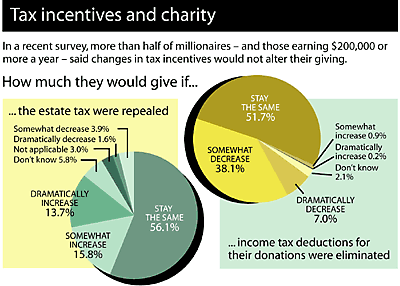
A long while ago, charities began to rely on a model which suggested a pretty strong relationship between tax incentives and charitable giving. The model came from an economist named Charles Clotfelter, who was at Duke. The model found that the charitable incentives in the tax code encouraged people to give to charities in higher levels than without those incentives. Unfortunately, some representatives of the charitable community argued a one to one relationship and then extended the logic to suggest two things which were not true. First, lowering tax rates would reduce charitable giving. That encouraged some representatives of the charitable community to oppose things like the 1981 Economic Recovery Tax Act and subsequent efforts to lower tax rates because they argued that lowering rates would lower donations. The evidence from several tax acts since 1981 suggests that was not true. But second, and in my opinion more importantly, the emphasis on incentives made some advocates forget the nature of the charitable deduction. The deduction was put in the code to encourage charitable gifts, and indeed, Clotfelter's research suggests that for many taxpayers it does. Not that every taxpayer makes a concerted calculation that their gift of X will lower their tax by Y - but the deduction does encourage people to do the right thing. Perhaps this incentive is like the fine for littering, which is rarely imposed but which encourages greater awareness of correct behavior.
The long term benefit of having a vibrant charitable sector comes in many areas including creating two things which the advocates of incentives seem to forget. A vibrant charitable sector encourages people to think about their society in broader terms than what is in it for me. At the same time a vibrant charitable sector creates competition for many social services that were there not a charitable sector would be provided only by government - with all the attendant risks of monopolies.
The Christian Science Monitor published an article on charities which includes some interesting facts. Donations amount to $260 billion annually and there is some evidence that as incomes rise so do charitable activities (although the poor give a higher percentage of their income to charities than the wealthy). Perhaps the most interesting date is presented above (which is from the CSM article) - the notion that elimination of the estate tax or the charitable deduction would not have a catastrophic effect on giving.
One of the footnotes to Clotfelter's research, which I think many have under-rated, is whether their is differential effects of giving based on commitment. It has always seemed clear to me that charities can be divided into at least two types. The first are where the donor has some emotional tie - a college or university or a church are two examples. The second would be places that have developed in part as a result of the charitable incentive - perhaps some cause related charities are here. In my mind, elimination of the incentive would have a smaller effect on those charities which have a strong level of personal or emotional ties.
Does that mean I am indifferent to the maintenance of the deduction? Of course not. I have always been skeptical of the linear relationship that some charitable advocates have painted between the deduction and the level of giving. But even with that concern it seems to me that the encouragement of alternatives to governmental provision are always advised. The argument is much more normative than empirical but no less important.



1 comment:
This blog post has been nominated for inclusion in The Blog Watch article published Sundays in The Sacramento Bee's Forum section. As part of a demonstration program, readers are invited to help rate the candidate blog posts. The highest-rated posts will get top consideration for the limited space available Sunday. To participate, visit ipsosacto.com/bw Voting ends Thursday afternoon.
Post a Comment